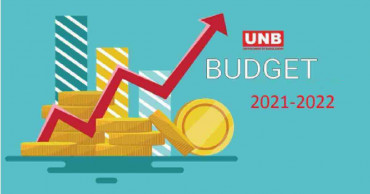Fiscal Year 2021-22
Parliament passes new budget of ‘lives and livelihoods’
Parliament passed the Tk 603,681 crore national budget for the fiscal year 2021-22 on Wednesday, the last day of the outgoing fiscal year (2020-21).
Finance Minister AHM Mustafa Kamal moved the Appropriations Bill, 2021 seeking a budgetary allocation of Tk 792,912.95 crore which was passed by voice vote.
On Tuesday, Parliament passed the Finance Bill 2021 with some changes.
Following the proposal mooted in the House by the Finance Ministry for the parliamentary approval of appropriation of funds for meeting necessary development and non-development expenditures of the government, the ministers concerned placed justifications for the expenditures by their respective ministries through 59 demands for grant.
Earlier, Parliament rejected by voice vote 625 cut-motions that stood in the name of opposition members on 59 demands for grants for different ministries.
Twelve MPs from Jatiya Party and BNP submitted their cut-motions on the budget, themed as "Bangladesh towards a resilient future protecting lives and livelihoods'.
Also read: Parliament passes Finance Bill, allows whitening of undisclosed money
They are Kazi Firoze Rashid, Rustam Ali Farazi, Mujibul Huq, Fakhrul Imam, Pir Fazlur Rahman, Shamim Haider Patwari, Begum Rawshan Ara Mannan, Harun Ur Rashid, Mosharrof Hossain, Liaquat Hossain Khoka, Mokabbir Kan, and Rumeen Farhana.
They were, however, allowed to participate in the discussion on Law Ministry, Secondary and Higher Education Division and Health Services Division.
Later, Speaker Dr Shirin Sharmin Chaudhury applied guillotine to quicken the process of passing the demands for grants for different ministries without giving the lunch break.
Opposition and independent MPs were present in the House when the Appropriation Bill was passed in Parliament and they did not raise any voice against passing of the bill.
The finance minister on June 3 placed a Tk 603,681 crore-national budget for 2021-22 fiscal to get the economy moving in spite of the crippling Covid-19 pandemic with a strong focus on vaccinating the population and shoring up their jobs.
A bold target has been set to achieve 7.2 per cent of GDP growth with a deficit totalling Tk. 214,618 crore, which is 6.2 per cent of GDP.
To meet the deficit, Tk 101,228 crore will come from external sources, while Tk 113,453 crore from domestic sources of which Tk 76,452 crore will come from the banking system and Tk 37,001 crore from savings certificates and other non-bank sources.
Also read: Medical College (Governing Bodies) (Repeal), Bill 2021 placed in parliament
The growth rate for 2021-2022 has been fixed at 7.2 percent, remaining consistent with the government’s long-term plan and taking the post-Covid recovery situation into account while expecting the inflation rate will be 5.3 per cent during the period.
Total allocation for operating and other expenditures has been set at Tk 378,357 crore, while the allocation for the annual development program is Tk 225,324 crore.
The total revenue income in the fiscal year 2021-2022 has been fixed at Tk 389,000 crore, which is 11.3 percent of GDP. Out of this, Tk 330,000 crore will be collected through the NBR sources. Tax revenue from non-NBR sources has been estimated at Tk 16,000 crore, while the non-tax revenue is estimated to be Tk 43,000 crore.
The allocation for the social infrastructure sector in the next fiscal budget is Tk 170,510 crore, which is 28.25 percent of total allocation, in which allocation for human resources sector (education, health and other related sectors) will be Tk 155,847 crore.
The allocation proposed for the physical infrastructure sector will be Tk. 179,681 crore or 29.76 percent, in which Tk 74,102 crore will go to overall agriculture and rural development, Tk 69,474 crore to overall communications, and Tk 27,484 crore to power and energy.
A total of Tk 1,45,150 crore has been allocated for general services, which is 24.04 percent of the total allocation. Tk 34,648 crore is for public-private partnerships (PPP), financial assistance to different industries, subsidies, equity investments in state-owned, commercial and financial institutions, which is 5.74 percent of the total allocation.
4 years ago
Businessmen given highest benefits with objective to create jobs: Finance Minister
Finance Minister AHM Mustafa Kamal has defended his tweaks to the law and budget items to provide businessmen the highest number of benefits in the proposed national budget for the fiscal year 2021-22, under an objective that they would reinvest in business, which would ultimately create more jobs.
He made the remarks while addressing a virtual post-budget press conference on Friday against the background of the Tk. 6,03,681 crore (Tk 6.03 trillion) budget placed Thursday in parliament, equivalent to 17.5 percent of GDP, for which in turn he set a target to achieve 7.2 percent growth in the 2021-22 fiscal.
In the budget, the overall deficit was outlined at Tk 2,14,681 crore, which is 6.2 percent of GDP. Kamal's plan is to meet it by mobilizing Tk. 101,228 crore from external sources, and Tk 113,453 crore from domestic sources. Two-thirds of the domestic financing, Tk. 76,452 crore, Kamal expects from the banking system, and the rest (Tk 37,001 crore) from savings certificates and other non-bank sources.
The revenue income was estimated to be at Tk 389,000 crore, which is 11.3 percent of GDP.
The Finance Minister said he placed the budget to keep the country’s economy on the trajectory of development and growth offsetting the fallout of Covid-19 as in the past.
Also read: New budget unveiled with focus on protecting lives and livelihoods
“This budget will create scopes for attracting new investment, generate new employment, protect the lives and livelihood of the marginalised people, and development. It is our firm belief,” he said.
He said more than 6.1 percent GDP growth is being attained in the outgoing fiscal year. "We’ll be able to attain 7.2 percent-plus GDP growth in the next fiscal year facing the corona situation,” he said.
Responding to a question as to what specific measures were taken to create employment since many people lost their jobs due to the pandemic, the Finance Minister said the top-most priority was given to the promotion of business in the national budget.
“The private sector has to be in the driving seat to generate employment. Government alone cannot create employment,” he said.
Agriculture Minister Abdur Razzak, Planning Minister Abdul Mannan, Bangladesh Bank Governor Fazle Kabir and Senior Secretary at Finance Division Abdur Rouf Talukder and National Board of Revenue (NBR) Chairman Abu Hena Md Rahmatul Muneem also spoke on the occasion.
Mustafa Kamal said many fiscal measures were taken in the budget to ease the business-related laws in order to promote business.
In many cases, taxes were lowered as the government’s main objective is not revenue collection, he said defending his position.
Also read: Allocation in budget for agriculture 'enough' for Dr Razzaque
He said works are going to determine the effect on the poorer sections by the Covid-19. “We have not received the complete data on the issue. Bangladesh Institute of Development Studies (BIDS) and Bangladesh Bureau of Statistics (BBS) have separately been working on the issue.”
The government will take measures after receiving the findings of their studies, he said.
About a question on black money whitening, the Finance Minister said it is "not yet decided" whether the scope will continue or not. That’s why the issue did not come in the budget speech.
He admitted there is a strong argument that the provision goes against equitable justice, although many people are in favor of its continuation. “But things will be clear within a month.”
In some of his strongest comments, he grew adamant to make the point that black money and undeclared money are not the same, as the latter is created due to flaws in the country’s economic system.
Defending the target of achieving 7.2 percent GDP growth, he said the economy has been performing better with huge growth of 39.4 percent in remittances and 13.69 percent growth in export business.
“So, like previous years, it will not be impossible to achieve this target,” he said.
Responding to a question on the country’s military budget, Finance Minister said this is an important sector, but it was not mentioned separately in the budget due to time constraints.
Finance Secretary Abdur Rauf informed that the military budget received an 8 percent higher allocation than the current fiscal year.
4 years ago
Budget lacks clear outline to protect lives, livelihoods: CPD
he national budget proposed for the fiscal year 2021-22 lacks a clear outline to protect the lives and livelihoods and tackle the challenges caused by the coronavirus pandemic, said Centre for Policy Dialogue (CPD) on Friday.
“It has been said in the budget to move ahead by protecting the lives and livelihoods, but there’s no clear outline how it’ll happen through necessary reforms and enhancing institutional capacity,” said CPD Executive Director Fahmida Khatun.
Speaking at a press conference, she said, “Unlike last year, there has been clarity of thoughts about Covid management in the budget documents, but it has no similarity with the measures and allocations to tackle the challenges.”
CPD, a non-governmental research organisation, arranged the programme at a city hotel to share its observations on the Tk 6,03,680 crore national budget presented by Finance Minister AHM Mustafa Kamal in Parliament on Thursday.
Read: CPD finds much in budget out of touch with reality
Fahmida said they hoped that the health sector would get much allocation this time, but it did not happen. “The allocation for the sector is 0.95 percent of the GDP like last year. The total allocation has been increased to some extent, but there’s no increase in absolute terms.”
Stating that the Health Ministry’s performance is the poorest in implementing the ADP, she said there will be no benefit if the allocation for the sector is enhanced without improving the institutional competence of the sector through reforms.
Fahmida also said good governance and accountability must be ensured in the health sector by removing corruption and irregularities for improving its services and proper implementation of the budgetary allocation. “We didn’t see any step over the last one and a half years to strengthen the sector and establish good governance.”
Read:New budget unveiled with focus on protecting lives and livelihoods
She said the allocation for the social security sector is not sufficient though several thousand crores of taka have been increased. It remains at 3 percent of the GDP like the previous year. “But the amount is negligible compared to the number of poor people in the country.”
Besides, she said, a quarter of the total social security has been allocated for the pension of the government employees.
4 years ago
Cabinet approves proposed budget for new fiscal
The Cabinet at a special meeting on Thursday approved the proposed 50th national budget for the fiscal year 2021-22, seeking to revive the pandemic-hit economy.
Read: New national budget to be presented Thursday, aims at regaining fast economic growth
Prime Minister Sheikh Hasina presided over the meeting held at the cabinet room of the Jatiya Sangsad Bhaban.
Finance Minister AHM Mustafa Kamal, other ministers and state ministers concerned attended the meeting.
Read: President to attend parliament to witness budget presentation
The Finance Minister is set to unveil the proposed national budget for the 2021-22 fiscal year. He is scheduled to start unfolding his second budget at the Jatiya Sangsad at 3:00 pm.
The budget will be the third one of the present Awami League government formed through the December-30 general election held in 2018.Read:Parliament’s budget session set to begin Wednesday
4 years ago
Spending on public servants' remuneration to witness uptick from next fiscal
The allocation of money for salaries and allowances of the public sector will see an uptrend from the next fiscal after a span of four years.
The government is going to allocate some 12.2% of the total budget in the upcoming fiscal of 2021-22 for salaries and allowances to the public servants and other related pockets.
The allocation of this sector will be 12.5% in 2022-23 fiscal of the total budget, according to an official document.
Read BSMMU announces Tk 602.73cr budget for FY 2020-21
The estimated amount of money for the next two fiscals would be Tk 745.3 billion and Tk 869.8 billion respectively.
After the 2016-17 fiscal, the amount of spending in salaries and allowances for the public servants, as a proportion of the budget witnessed a downward slide.
In 2016-17 fiscal the allocation was 18.2% while it nosedived to 14.8% in 2017-18 fiscal.
The allocated amount for the 2016-17 fiscal was Tk 490.43 billion whereas the allocation reduced to Tk 478.5 billion in the following fiscal.
As per the document, the allocation in 2013-14 fiscal was Tk 263.94 billion (14%) and Tk 288.20 billion (14.8%) in 2014-15.
Also read: When govt allowances kick in at 90!
The allocation saw a sharp rise in 2015-16 and 2016-17 fiscals with 16.7% and 18.2% of the total budget allocation. The amounts during these two fiscals for the salaries and other allowances were Tk 400.50 billion and Tk 490.43 billion.
The document said that the rise in the allocation occurred due to implementation of the new pay scale for the public servants that continued for the two consecutive fiscals.
The expenditure in the sector reduced to 14.8% (Tk 478.5 billion) of the budget in 2017-18 fiscal and 13.6% (Tk 534 billion) in 2018-19 fiscal.
The trend continued in 2019-20 fiscal with 12.2% and in 2020-21 fiscal with 11.6%.
The allocation for the fiscals were Tk 607.5 billion and Tk 650 billion respectively.
Also read: All senior citizens to receive old-age allowance by 2025: Minister
The official document expected that the trend of expenditure for the salaries and allowances in the coming two fiscals would be in the normal trend with 12.2% and 12.5% allocation of the total budget.
The country is likely to get Tk 5933.14 billion budget for 2021-22 fiscal, Tk 253.14 billion higher than the running one, aiming to face the COVID-19 pandemic challenge for recovering the economy.
Amid the coronavirus crisis, the government had taken up a comprehensive plan with four main strategies.
These are: discouraging luxury expenditures, prioritising government spending that creates jobs, creating loan facilities through commercial banks at subsidised interest rate for the affected industries and businesses, and expanding the coverage of the government’s social safety net programmes.
Read Budget: Prices of tobacco products up, gold down
Meanwhile, the government has estimated to bring down its expenditure in current account while increasing the capital expenditure in the next 2021-22 and 2022-23 fiscals.
According to an official document, the current expenditure for 2021-22 and 2022-23 fiscal has been estimated at 54.4% and 54.5% of the total budget respectively.
Salaries and allowances of public servants, purchase of product and service, compensation and relocation expenses, payment of interest against foreign and domestic loans are under the segment of current expenditure. Besides, ‘food accounts’ and ‘expense for structural coordination’ are also under this expenditure.
Also read 5pc increment for non-govt edu teachers, employees announced
On the other hand, government funded annual development programme (ADP) and non-ADP capital expenditure are the main two items under the capital expenditure. Besides, loan and advance, development programmes from revenue budget, projects outside the ADP and non-ADP food for work programme and handover expenses are also under this expenditure.
4 years ago

.jpg)






